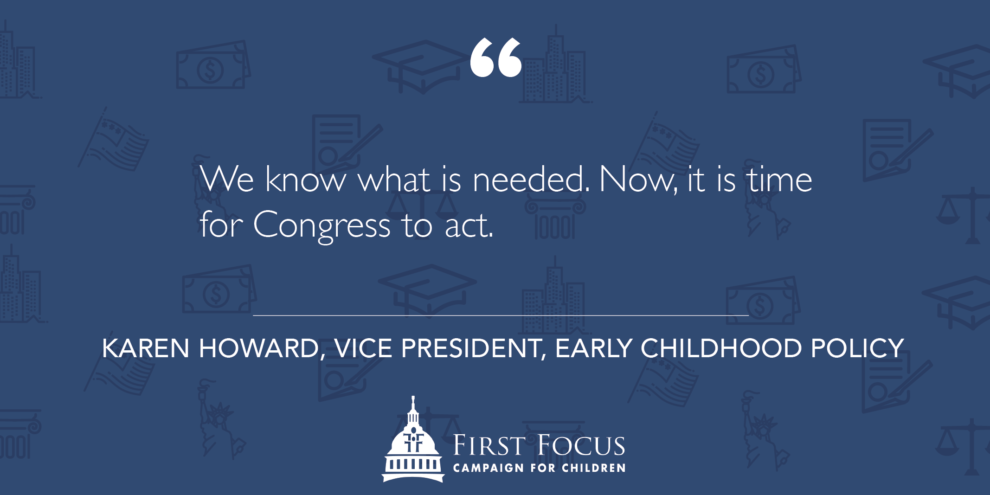
Millions of children and families are at risk of entering foster care. But research has shown that evidence-based prevention services strengthen families and can help make foster care the option of last resort. The legislative proposals outlined below recognize that creating a culture of wellness and prevention requires systemic changes on the state and national level that require time and resources. These measures also recognize the need to improve foster care and access to meaningful opportunities of older foster youth to thrive.
As we celebrate Children’s Week, we urge Congress to fundamentally improve the lives of millions of children and families by enacting or reauthorizing the following bills:
1. Child Abuse Prevention and Treatment Act (CAPTA)
Experts estimate that 700,000 children suffer abuse in the United States every year. But research has shown that providing quality health care, safe housing, substance use treatment and counseling, parenting or coaching services, and other supports can help prevent child maltreatment. The Child Abuse Prevention and Treatment Act (CAPTA) is the only federal program devoted solely to the prevention, treatment and assessment of child abuse and neglect. Enacted in 1974, CAPTA has always sought to offer those supports. Over successive years, the list of services and programs allowed under CAPTA has been long, but funding has fallen well short of what is needed for states to create and expand systems of care that empower children and families to live healthy, safe lives. CAPTA is now up for reauthorization. First Focus Campaign for Children and our partner advocates are calling on Congress to fund CAPTA at $500 million annually for titles I and II each, for a total allocation of $1 billion. It is a bold request, but if we want our children to thrive and succeed, Congress must invest in prevention programs and systems that ensure their safety and success.
2. Family First Transition and Support Act
In 2018, Congress passed the Family First Prevention Services Act, which for the first time in history, provides Title IV-E funding aimed at keeping children safely at home with prevention support offered to their families. Prior to the passage of this legislation, Title IV-E funding was only available for foster care payments after children were removed from their families, rather than to prevent child maltreatment in the first place. The legislation emphasizes prevention, but also aims to improve foster care by favoring family-like settings that research has shown improve outcomes for foster youth. The legislation offered a major step toward incentivizing child abuse prevention services and slowing the rate of children entering care. But states need time and resources to implement the fundamental shift in their systems required to meet the goals of FFPSA. States need the Family First Transition and Support Act in order to thoughtfully implement the law. This transition legislation also eliminates the current “look-back” provision that ties eligibility to federal funding for foster care to an outdated Aid to Families with Dependent Children program, a defunct program that was last operated in 1996, and which significantly curtails funding for foster care. Congress took a bold stand when it passed FFPSA last year. Now lawmakers must see that vision through by adopting FFTSA and delivering on the promises of child abuse prevention and better lives for foster youth.
3. Expedite the Effective Date of the Medicaid provisions for Former Foster Youth in the Support for Patients and Communities Act
As part of last year’s Support for Patients and Communities Act, Congress passed legislation that allows former foster youth who age out of care to continuously remain on Medicaid until age 26. The provisions were meant to mirror the popular piece of the Affordable Care Act that allows young adults to remain on their parents’ insurance until age 26. Unfortunately, the law delayed implementation of continuous Medicaid coverage for foster youth until 2023. Members of Congress are currently planning to introduce a bill that would eliminate this delay, allowing former foster youth to receive continuous Medicaid coverage as soon as it’s passed. Health care coverage is critical for former foster youth, who often face chronic health and behavioral conditions as a result of trauma experienced during their childhood. In fact, unmet health needs often prevent former foster youth from pursuing higher education, gainful employment and other pursuits as a result of unmet health needs. Congress can change the trajectory of these young lives by ensuring they have insurance coverage.
4. Foster Youth and Driving Act
Learning to drive is a rite of passage to young adulthood for millions of youth. It brings new independence and opportunity, allowing young people to take themselves to school, work, and social and other activities. However, teens in foster care often face significant barriers to obtaining a driver’s license. They may have difficulty securing the required parental or guardian permission to enroll in driver’s education or to obtain insurance. They may not be able to pay the various fees associated with becoming a driver. Without a driver’s license, young people in foster care often miss out on adolescent experiences and opportunities that contribute to success in adulthood. The Driver’s License and Foster Youth Act will help states develop programs that let foster youth obtain driver’s education, driver’s licenses, auto insurance and motor vehicles. This legislation can make a measurable difference in the lives of countless young people who want to have the same opportunities as their peers to work, attend school and participate in community activities.
We know what is needed. Now, it is time for Congress to act. We urge Congress to prioritize the needs of children and families by enacting these laws.